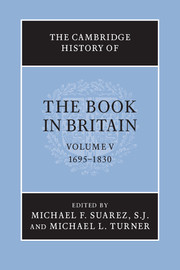Book contents
- Frontmatter
- Introduction
- PART I THE QUANTITY AND NATURE OF PRINTED MATTER
- PART II ECONOMIC, LEGAL AND CULTURAL CONTEXTS
- PART III THE TECHNOLOGIES AND AESTHETICS OF BOOK PRODUCTION
- PART IV THE BOOK TRADE AND ITS MARKETS
- V BOOKS AND THEIR READERS
- I RELIGIOUS BOOKS
- II LITERATURE AND THE CULTURE OF LETTERS
- III SPECIALIST BOOKS AND MARKETS
- 38 Collecting and the antiquarian book trade
- 39 The Stationers’ Company and the almanack trade
- 40 Children’s books and school-books
- 41 Music
- 42 Maps, charts and atlases in Britain, 1690–1830
- 43 Enlarging the prospects of happiness: travel reading and travel writing
- 44 Law books
- 45 Philosophical books
- 46 Scientific and medical books, 1695–1780
- 47 Scientific and medical books, 1780–1830
- 48 ‘Radical publishing’
- 49 Mining the archive: a guide to present and future book-historical research resources
- Abbreviations used in bibliography
- Bibliography
- Index
- Frontispiece
- Plate section
- References
38 - Collecting and the antiquarian book trade
from III - SPECIALIST BOOKS AND MARKETS
Published online by Cambridge University Press: 28 September 2010
- Frontmatter
- Introduction
- PART I THE QUANTITY AND NATURE OF PRINTED MATTER
- PART II ECONOMIC, LEGAL AND CULTURAL CONTEXTS
- PART III THE TECHNOLOGIES AND AESTHETICS OF BOOK PRODUCTION
- PART IV THE BOOK TRADE AND ITS MARKETS
- V BOOKS AND THEIR READERS
- I RELIGIOUS BOOKS
- II LITERATURE AND THE CULTURE OF LETTERS
- III SPECIALIST BOOKS AND MARKETS
- 38 Collecting and the antiquarian book trade
- 39 The Stationers’ Company and the almanack trade
- 40 Children’s books and school-books
- 41 Music
- 42 Maps, charts and atlases in Britain, 1690–1830
- 43 Enlarging the prospects of happiness: travel reading and travel writing
- 44 Law books
- 45 Philosophical books
- 46 Scientific and medical books, 1695–1780
- 47 Scientific and medical books, 1780–1830
- 48 ‘Radical publishing’
- 49 Mining the archive: a guide to present and future book-historical research resources
- Abbreviations used in bibliography
- Bibliography
- Index
- Frontispiece
- Plate section
- References
Summary
The British public was introduced to formal book auctions with printed catalogues in 1676, when William Cooper sold the collection of Dr Lazarus Seaman. By 1695 the practice of selling books by auction was firmly established: twenty-nine catalogues are recorded for that year, all but two of them (Edinburgh and Dublin) issued in London. The considerable number of catalogues published before 1700 demonstrates not only the significant collections to be put on the market – eighteen of the catalogues for 1695 are for named sales – but also the presence of receptive consumers and a well-organized antiquarian trade. The sale of Sir Charles Scarburgh’s library serves as a representative case in point. A prominent physician, Scarburgh had personally acted for Charles II, James II, Queen Mar and Prince George of Denmark before his death on 26 February 1694. In 1695, two sales were required to disperse his library, which was divided between his large assortment of the classics, history, theology and literature, and his more specialized assemblage on the history of mathematics and medicine. He was a typical collector of his time: well educated, prosperous and with an interest in the history of his profession. Less typical, but more historically significant, were the libraries of the fellow diarists Samuel Pepys and John Evelyn. Pepys secured a further sort of immortality by bequeathing his books and manuscripts to Magdalene College, Cambridge, where they can still be seen in their original furniture. Evelyn’s collection, much of it elegantly bound, fared less well. From 1706 until well into the twentieth century, individual volumes were alienated from the collection, the great bulk of which was finally sold by his descendants in 1977–8.
Keywords
- Type
- Chapter
- Information
- The Cambridge History of the Book in Britain , pp. 711 - 722Publisher: Cambridge University PressPrint publication year: 2009



